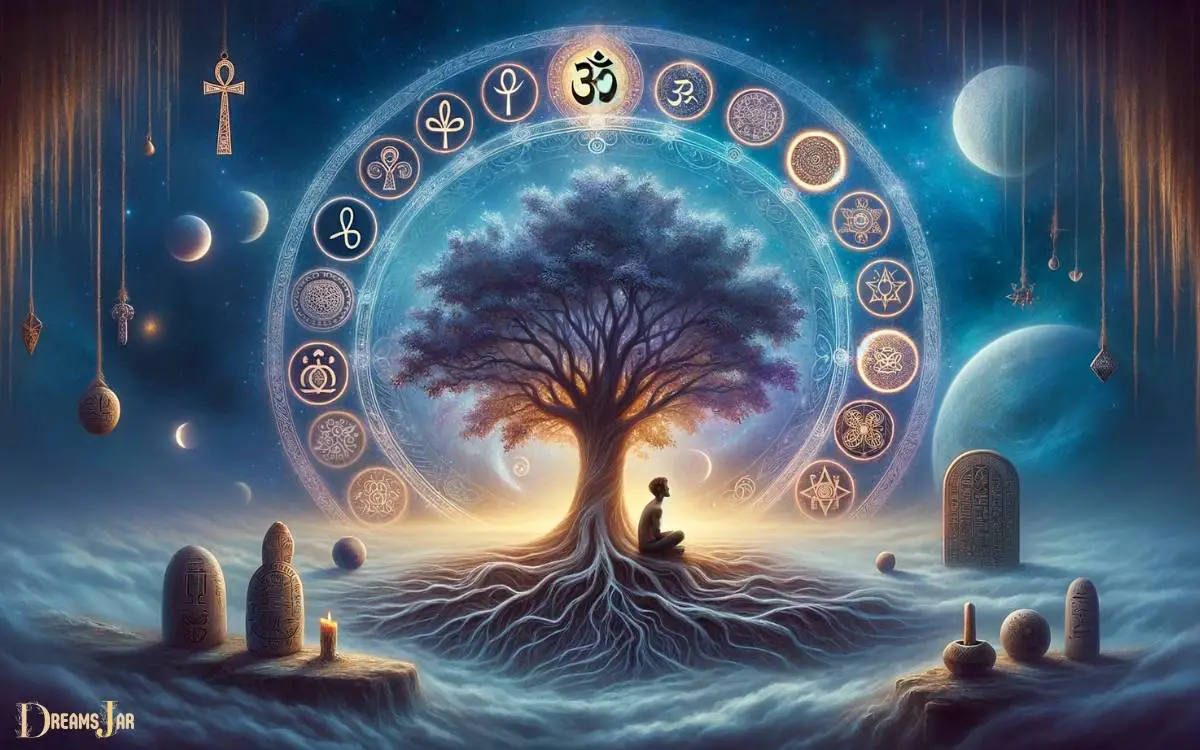Dream of Dead Father Dying Again Meaning: Unresolve Emotion!
Dreaming of a deceased father passing away again often signifies unresolved emotions or the processing of grief. It may reflect the dreamer’s internal struggles with letting go or an ongoing search for closure.
Such a dream can also symbolize transformation or a deep subconscious connection to the father figure.
The dream interpretation can vary based on individual circumstances, but here are some common themes associated with this type of dream:
Dreams of a dead father dying again often unveil deep psychological processes related to grief and transition.

Key Takeaway
Understanding Dreams of a Deceased Father Dying Again
| Symbolism | Possible Interpretation |
|---|---|
| Death | End of a phase, change, or transformation |
| Father Figure | Authority, protection, or unresolved issues |
| Dying Again | Unresolved grief, need for closure, or internal struggle |
| Emotional Storm | Internal conflict, emotional turmoil, or stress |
| Cultural/Spiritual Insights | Beliefs about afterlife, ancestral messages, or spiritual guidance |
Symbolism of Death in Dreams
The symbolism of death in dreams can offer profound insights into our subconscious thoughts and emotions. When we dream of death, it’s natural to feel unsettled, but these dreams often symbolize the end of one thing and the beginning of something new.

It’s crucial to remember that dreaming of death doesn’t predict actual death; instead, it represents change, transition, and transformation in our waking lives.
Our subconscious mind uses death as a metaphor for the end of a situation, relationship, or phase, allowing room for growth and new opportunities.
Exploring the emotions and circumstances surrounding the death in the dream can provide valuable clues about what needs closure or transformation in our lives.
Understanding the symbolism of death in dreams can help us navigate life’s changes with greater awareness and resilience.
Connection to Unresolved Grief
As someone who has experienced the loss of a loved one, I understand the profound impact it can have on our mental health. The unresolved grief from losing a father can linger, affecting our emotional well-being and daily life.

Seeking closure and healing is essential to navigate the complex emotions tied to the dream of a dead father dying again.
Impact on Mental Health
My father’s death in my dreams affects my mental health, highlighting my unresolved grief. These dreams can be incredibly distressing and can have a significant impact on my overall well-being.
They often bring back the emotions and pain associated with his passing, making it feel like I am reliving the loss all over again.
The unresolved grief from my father’s death can manifest in these dreams, causing me to experience heightened levels of anxiety, sadness, and even guilt.
It’s important to recognize that these dreams are a normal part of the grieving process, but they can also indicate that I may need additional support in coping with my loss.
Seeking therapy or talking to a trusted friend or family member about these dreams can help me work through the unresolved grief and improve my mental health.
Seeking Closure and Healing
Feeling a deep need to seek closure and healing, I grapple with the unresolved grief stemming from my father’s death, particularly when I experience recurring dreams of his passing. The emotional weight of these dreams often leaves me seeking understanding and resolution.
Here are some key points to consider:
- Acknowledging the grief: It’s crucial to recognize and accept the depth of the unresolved grief to begin the healing process.
- Seeking support: Engaging with a support system, such as friends, family, or a therapist, can provide invaluable assistance in navigating the complex emotions tied to the loss.
- Honoring memories: Finding ways to honor and cherish the memories of our loved ones can aid in the healing journey.
- Self-compassion: Practicing self-compassion and allowing oneself the time and space needed to heal is essential in the process of seeking closure and healing.
Understanding the impact of unresolved grief and actively seeking closure can lead to a more peaceful emotional state.
Psychological Impact of Repeated Loss
Experiencing the death of a loved one is an indescribable pain, and the psychological impact of facing repeated loss can be profound. Revisiting unresolved grief from previous losses can resurface complex emotions and disrupt our mental equilibrium.

Coping with recurring trauma requires a deeper understanding of how it shapes our mental health and influences our ability to heal.
Revisiting Unresolved Grief
As someone who has experienced the loss of a loved one, revisiting unresolved grief can bring about intense emotional turmoil and psychological distress.
The impact of repeatedly experiencing the loss of a loved one can be overwhelming, and it’s important to acknowledge and address these emotions.
Here are four key points to consider:
- Emotional Resurgence: Revisiting unresolved grief may lead to a resurgence of intense emotions, such as sadness, anger, or guilt, as if the loss has just occurred.
- Psychological Strain: The psychological burden of repeatedly processing grief can lead to increased stress, anxiety, and even symptoms of depression.
- Disrupted Coping Mechanisms: Repeated loss can disrupt one’s ability to cope with new challenges and may lead to feelings of helplessness or hopelessness.
- Impact on Relationships: Unresolved grief may affect relationships, causing strain and potentially leading to social withdrawal or isolation.
Understanding the psychological impact of revisiting unresolved grief is crucial for individuals navigating this complex emotional journey.
Coping With Recurring Trauma
Coping with recurring trauma from repeated loss can be incredibly challenging and impactful on one’s mental well-being.
The psychological toll of experiencing multiple losses can be overwhelming. It’s common to feel a sense of powerlessness and emotional exhaustion when faced with ongoing grief.
Recurring trauma can lead to heightened anxiety, depression, and difficulty in forming and maintaining relationships. It’s important to acknowledge the cumulative impact of these losses and seek support from mental health professionals.
Therapy can provide a safe space to process and work through the layers of grief, helping to build resilience and coping strategies.
Additionally, practicing self-care, setting boundaries, and engaging in activities that bring comfort and joy can help in managing the psychological effects of recurring trauma. Remember, it’s okay to seek help and take the time needed to heal.
Impact on Mental Health
Feeling the cumulative impact of recurring trauma from repeated loss can be overwhelming and lead to heightened anxiety and depression, affecting my mental well-being in profound ways.
The psychological impact of experiencing the death of a loved one repeatedly can have long-lasting effects, such as:
- Persistent feelings of sadness and hopelessness.
- Increased levels of stress and anxiety.
- Difficulty in forming and maintaining relationships.
- Struggles with self-esteem and self-worth.
These effects can significantly impact daily functioning and quality of life, making it crucial to address the psychological toll of repeated loss.
Seeking closure and healing becomes essential for navigating through this complex emotional landscape and finding a path towards recovery and resilience.
Seeking Closure and Healing
When dreaming of my dead father dying again, I find myself seeking closure and healing to make sense of the emotions and memories that resurface.

The dream can bring about a range of emotions, from sadness and confusion to a deep yearning for understanding and resolution. It’s essential to process these feelings and work towards finding peace.
Here are some strategies that can help in seeking closure and healing:
| Strategies for Seeking Closure and Healing | Description | Benefits |
|---|---|---|
| Expressing emotions | Writing, talking to a trusted friend or therapist, or creating art can help release pent-up emotions and bring a sense of relief. | Allows for emotional release and can lead to a sense of catharsis. |
| Reflecting on memories | Taking time to remember and honor the positive memories can contribute to a sense of closure. | Fosters a deeper understanding of the relationship and promotes healing. |
| Engaging in self-care | Prioritizing self-care activities such as exercise, meditation, and spending time with loved ones can help in the healing process. | Promotes emotional well-being and provides a sense of comfort and support during a difficult time. |
Cultural and Spiritual Interpretations
One significant aspect to consider when exploring the dream of a dead father dying again is the cultural and spiritual interpretations associated with such dreams.
Understanding the cultural and spiritual significance can provide valuable insight into the subconscious and emotional aspects of the dream.

Here are four important cultural and spiritual interpretations to consider:
- Ancestral Communication: In some cultures, dreaming of a deceased father can be seen as a form of communication from the spirit world, where the father may be imparting wisdom or guidance.
- Symbolism of Loss and Grief: The dream might symbolize unresolved grief or the need to come to terms with the loss, reflecting the influence of cultural attitudes towards death and mourning.
- Spiritual Transition: It may signify a spiritual transition or transformation, reflecting the influence of spiritual beliefs and practices on the interpretation of dreams.
- Personal Beliefs and Traditions: The interpretation of such dreams can be deeply influenced by personal cultural and spiritual beliefs, as well as familial traditions and customs.
Understanding these interpretations can provide comfort and aid in the process of finding meaning and healing.
Coping Strategies and Supportive Resources
As for me, in dealing with the dream of my dead father dying again, I find comfort and support through connecting with others who have had similar experiences and seeking guidance from mental health professionals.

Sharing my feelings with those who understand the complexity of such dreams has been immensely helpful. Additionally, professional counseling has provided me with tools to process and understand the emotions tied to these dreams.
Below is a table outlining some coping strategies and supportive resources that individuals may find beneficial when navigating similar experiences.
| Coping Strategies | Supportive Resources |
|---|---|
| Seeking therapy | Grief support groups |
| Meditation and yoga | Journaling |
| Connecting with loved ones | Reading self-help books |
| Engaging in hobbies | Online forums and communities |
| Mindfulness practices | Hotlines for immediate support |
Navigating the emotions and uncertainties surrounding dreams of a deceased loved one can be challenging, but with the right support and coping mechanisms, it is possible to find peace and understanding.
Conclusion
Losing a loved one is never easy, and dreaming of their death can bring up a lot of emotions. It’s important to recognize the symbolism and meaning behind these dreams, and to seek support and closure if needed.
For example, a woman who lost her father in a car accident may dream of his death repeatedly, signaling unresolved trauma and grief. By addressing these dreams and seeking therapy, she can find healing and acceptance.






